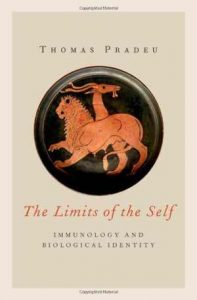نام کتاب: The Limits Of The Self – Immunology And Biological Identity
نویسنده: Thomas Pradeu و Elizabeth Vitanza
ویرایش: ۱
سال انتشار: ۲۰۱۲
کد ISBN کتاب: ۰۱۹۹۷۷۵۲۸۱, ۹۷۸۰۱۹۹۷۷۵۲۸۶,
فرمت: PDF
تعداد صفحه: ۳۲۰
حجم کتاب: ۱ مگابایت
کیفیت کتاب: OCR
انتشارات: Oxford University Press
Description About Book The Limits Of The Self – Immunology And Biological Identity From Amazon
What counts as an individual in the living world? What does it mean for a living thing to remain the same through time, while constantly changing? These questions are the province of immunology, one of the most dynamic fields in biology. Immunology answers these questions with its theory of “self” and “nonself” which has dominated the field since the 1940s. Thomas Pradeu argues that this theory is inadequate, because immune responses to self constituents and immune tolerance of foreign entities are the rule, not the exception. Instead Pradeu advances an alternative theory, the continuity theory, which offers a new way to answer the question of what triggers an immune response. It also echoes the recent realization that all organisms, and not only higher vertebrates, have an immune system.
Pradeu’s main thesis is that the self-nonself theory should be abandoned, but that immunology still proves to be decisive for delineating the boundaries of the organism. Articulating an evolutionary and an immunological perspective, he offers an original conception of the organism. Tolerance of the fetus by the mother and of countless bacteria on the body’s surfaces proves that every organism is heterogeneous, that is, made of entities of different origins. In other words, every organism appears as a chimera , a mixed living thing-the cohesiveness of which is ensured by the constant action of its immune system.
The Limits of the Self, will be essential reading for anyone interested in the definition of biological individuality and the understanding of the immune system. Key words: immune system, self, non-self, tolerance, identity, individuality, theoretical immunology, continuity-discontinuity theory, philosophy of immunology, philosophy of biology.
درباره کتاب The Limits Of The Self – Immunology And Biological Identity ترجمه شده از گوگل
چه چیزی به عنوان یک فرد در دنیای زنده محسوب می شود؟ اینکه یک موجود زنده در طول زمان ثابت بماند ، در حالی که دائما تغییر می کند ، به چه معناست؟ این س questionsالات استان ایمونولوژی ، یکی از پویاترین حوزه های زیست شناسی است. ایمونولوژی با تئوری “خود” و “خود” که از دهه ۱۹۴۰ در این زمینه تسلط دارد ، به این سالات پاسخ می دهد. توماس پرادئو استدلال می کند که این نظریه ناکافی است ، زیرا پاسخ های ایمنی به خود سازندگان و تحمل ایمنی موجودات خارجی یک قاعده است ، و نه یک استثنا. در عوض پرادئو یک نظریه جایگزین ، نظریه تداوم را ارائه می دهد ، که راهی جدید برای پاسخ به این سوال که چه چیزی پاسخ ایمنی را تحریک می کند ، ارائه می دهد. همچنین این درک اخیر است که همه ارگانیسم ها ، و نه تنها مهره داران بالاتر ، دارای سیستم ایمنی هستند.
تز اصلی پرادئو این است که نظریه خود-شخصی باید کنار گذاشته شود ، اما ثابت می شود که ایمونولوژی برای تعیین مرزهای ارگانیسم تعیین کننده است. وی با بیان دیدگاه تکاملی و ایمنی شناختی ، تصوری اصلی از ارگانیسم ارائه می دهد. تحمل جنین توسط مادر و تعداد بیشماری باکتری در سطح بدن ثابت می کند که هر ارگانیسمی ناهمگن است ، یعنی از موجوداتی با ریشه های مختلف ساخته شده است. به عبارت دیگر ، هر ارگانیسم به عنوان یک کایمرا ظاهر می شود ، یک موجود زنده مخلوط – انسجام آن با عملکرد مداوم سیستم ایمنی بدن آن تضمین می شود.
محدودیت های خود ، خواندن ضروری برای هر کسی است که به تعریف فردیت بیولوژیکی و درک سیستم ایمنی بدن علاقه مند است. واژه های کلیدی: سیستم ایمنی ، خود ، غیرخود ، تحمل ، هویت ، فردیت ، ایمونولوژی نظری ، نظریه پیوستگی – ناپیوستگی ، فلسفه ایمونولوژی ، فلسفه زیست شناسی.
[box type=”info”]![]() جهت دسترسی به توضیحات این کتاب در Amazon اینجا کلیک کنید.
جهت دسترسی به توضیحات این کتاب در Amazon اینجا کلیک کنید.![]() در صورت خراب بودن لینک کتاب، در قسمت نظرات همین مطلب گزارش دهید.
در صورت خراب بودن لینک کتاب، در قسمت نظرات همین مطلب گزارش دهید.

